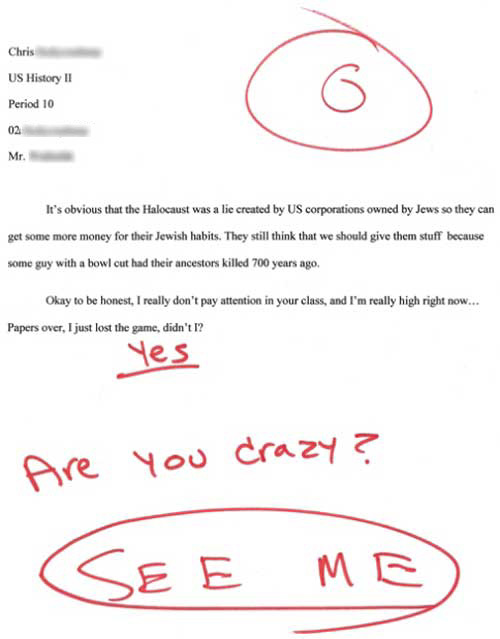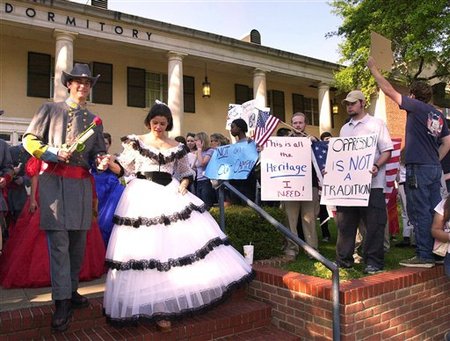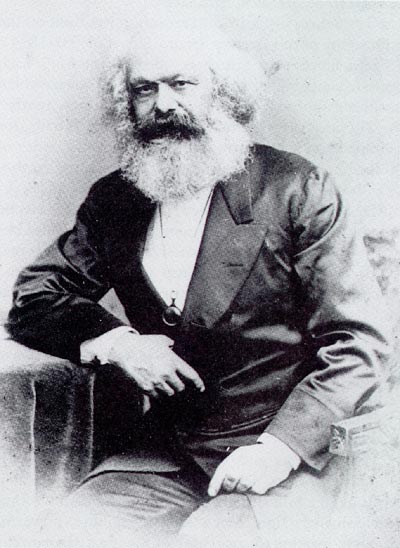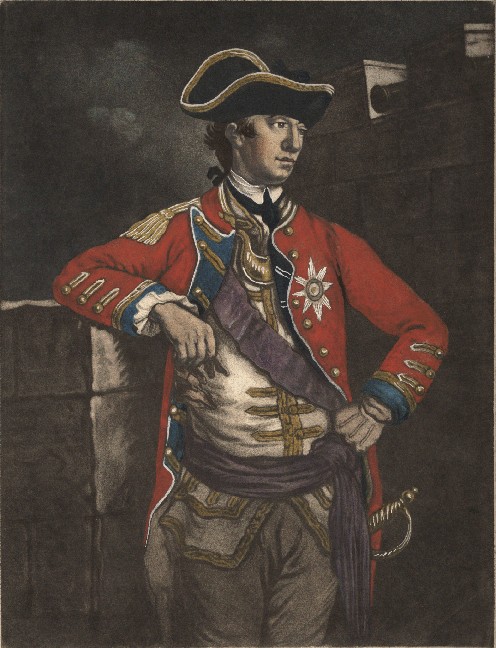
Last Days of School … And Looking Ahead
I’m bored to death. Last week of school here in Colorado. We have our finals on Thursday, teacher workday with grades due Friday, and then it is off for the summer. You’re probably asking why I would be bored, it’s the last days of school!? Well, I had 3 U.S. Government classes and 1 History class. Our Government classes are “Senior” level classes and the Seniors graduated last Tuesday. Soooo, I’ve been doing a lot of nothing. That’s not true, I have been working on A.P. U.S. History for next year (already lesson planning). I have two papers due this Sunday in my Graduate school work, so I have been busy in a different way.
Seeing that this Fall will be my first venture into A.P. land I have been doing some research looking for other A.P. teachers out there and came across a nice post on the USHistoryBlog. In this post, blogger Aaron Eyler asks “What Should History Teachers Teach?” He poses some interesting questions and has some very thoughtful responses. Eyler writes, that because of standards where we have to cover so much that teaching becomes an issues as we have so much to cover. He said, “This only becomes more difficult in classes such as AP History where students are responsible for taking a test in May based on 500 years of history.”
Out here in Colorado we have what are called “Essentials” for each general class (not A.P.) and as a teacher you HAVE to cover that material. We cover U.S. history from the American Revolution to the 1990s and today, if we can. It’s a fast and furious pace and it ultimately leaves 90% of the classroom completely dazed and confused and they leave with less interest in history than when they entered… if you can imagine that!
Anyway, with A.P. I will have to get through it all by May as that A.P. test will be there looming.
Anti-Federalist or Federalist and Is More Government Really the Answer?
Perhaps those Tea Bag attendees were not a bunch of redneck racists, but actually were just concerned over what our government is becoming and that more government is maybe not the answer. A government that started to get fat under Bush and the Republicans, and is now getting obese under the Democrats. So this story below was just too much to pass up and not post, and is a perfect example:
“Dead People Get Stimulus Checks” and not a couple, but THOUSANDS adding up to “millions” of dollars. Well, at least even the dead folks get some cold cash.
Now we’re talking a national health care program for tens of millions of people. I have one question, with the current budget (both a Democrat and Republican creation), how on earth do we pay for health coverage for millions of people WITHOUT raising taxes, and not just on the evil rich people, but everyone? Remember back when everyone was up in arms over the billions (chump change today) being spent in Iraq? I was one of them.
I guess we can put our heads in the sand and just assume the government will take care of it and knows what it’s doing… somehow I am not filled with a lot of confidence on that.
Call me crazy.
Now, some interesting questions about our founding and the principles of limited government, which, were very important to both Federalists and Non-Federalists. Yes, the Nationalists wanted a strong central government and an executive branch (yes, an oversimplification). But the Constitution was intended to “limit” the government. It stated what it could do and only what it could do. And of course, the Non-Federalists were very concerned about what a strong central government and a too powerful executive branch could become.
I do think it is unfortunate that many Tea Bag folks seem to talk about the Founders and the Federalist, yet they should be reading the Anti-Federalist’s papers instead.
Here’s an interesting Question, would today’s Republicans be the Anti-Federalists and the Democrats Federalists? After all, Jefferson was a Anti-Federalist and Hamilton a Federalists. If they were alive today, I would think Jefferson a Democrat and Hamilton for sure a Republican…right? Or wrong?
Old South Event leads to Protest

Last month members of the University of Alabama’s Kappa Alpha Order participated in a tradition that has produced some controversy. The students dressed in Confederate military uniforms and accompanied by dates dressed in traditional dresses, and attended an Old South event in Shreveport, La. The fraternity traces its roots to the Civil War and Confederate Gen. Robert E. Lee.
According to one person, “…they were being insensitive. I don’t think they understood the broader implications of what they were doing.” According to the article, students and other community members were offended by the sight of “fraternity members in rebel uniforms and white women from another sorority in hoop skirts.”
In respone, Larry Wiese, executive director of the Kappa Alpha Order issued a statement: “Old South celebration, including the parade, has been a Kappa Alpha tradition at Alabama for many years but we are sensitive to the concerns of students, faculty and the community.”
First, lets just set aside the whole Freedom of Expression rights.Therefore, it seems to me there are two ways to view this: 1) the motives of these individuals is pure racism and therefore should be stopped; 2) the motives of these students is to honor history and tradition, and whether we like it or not, the Old South did indeed exist and to disallow such events is to ignore an important aspect of history; albeit a regretable part. Therefore they are simply “reenactors.”
The photo above shows the “reenactors” on their way to the dinner or dance, whatever. I don’t know what side I agree with most.
I can see this issue both ways. A strong argument would be that: would we allow Germans to dress up like Nazi’s and celebrate National Socialism? Obviously not. So does that apply here? You could make a case obviously.
But I think there are other issues as well. I think this would be agreat debate subject in the classroom.
Karl Marx and the American Civil War
 While doing some research concerning a paper for my American Revolution graduate class I stumbled on this article “Karl Marx and the American Civil War”, by Gerald Runkle in Comparative Studies in Society and History, Vol. 6, No. 2 (Jan., 1964). Runkle stated in his article that his goal(s) were:
While doing some research concerning a paper for my American Revolution graduate class I stumbled on this article “Karl Marx and the American Civil War”, by Gerald Runkle in Comparative Studies in Society and History, Vol. 6, No. 2 (Jan., 1964). Runkle stated in his article that his goal(s) were:
“…to discuss Marx’s views on the American Civil War. What did he think was taking place on this side of the Atlantic? Where were his sympathies? What was the theoretical significance of the War? How accurate was Marx historically? How consistent was he ideologically?”
Marx was of course alive during the Civil War and though he never visited America, he wrote several articles for New York Daily Tribune. He also wrote over 30 articles for The Vienna Presse. I also did some searching and found some of Marx’s writing on the Civil War and it’s interesting that he was able to see the causes of the Civil War far differently than did the British and other Europeans.
Here’s an article he wrote for The Vienna Presse in October of 1861, and in it he writes that the London Press has incorrectly defined the “war between the North and South [as] a tariff war. The war is, further, not for any principle, does not touch the question of slavery and in fact turns on Northern lust for sovereignty…The question of slavery, however, as The Saturday Review categorically declares among other things, has absolutely nothing to do with this war. ”
Marx’s class struggle ideology clearly aided him in seeing the struggle over slavery and especially the situation dealing with slavery as a cause of the Civil War, he writes:

“…the number of actual slaveholders in the South of the Union does not amount to more than three hundred thousand, a narrow oligarchy that is confronted with many millions of so-called poor whites, whose numbers have been constantly growing through concentration of landed property and whose condition is only to be compared with that of the Roman plebeians in the period of Rome’s extreme decline.”
After reviewing the trail of events leading to the Civil War, Marx comes to one conclusion:
“The whole movement was and is based, as one sees, on the slave question. Not in the sense of whether the slaves within the existing slave states should be emancipated outright or not, but whether the twenty million free men of the North should submit any longer to an oligarchy of three hundred thousand slaveholders; whether the vast Territories of the republic should be nurseries for free states or for slavery…”
That Marx could see the Civil War so clearly at the time when so many others could not is very interesting, but perhaps should not be, especially when considering his political and social beliefs. I find his ideas interesting, but not appealing. Though in this instance they helped him see something that not a lot of people did see in 1861.
There has to be a way for me to incorporate some of this into my AP U.S. History class this coming Fall. I’ll probably use Marx’s article and then find something to compare it with.
Did Howe Intentionally Hold Back Against Washington and his Patriots?
 It’s an interesting question and one I would never have considered until I read Thomas J. Fleming’s 1964 article “The Enigma of General Howe,” in American Heritage magazine.
It’s an interesting question and one I would never have considered until I read Thomas J. Fleming’s 1964 article “The Enigma of General Howe,” in American Heritage magazine.
Fleming’s argument, essentially, is that Sir William Howe was not incompetent, but instead intentionally held back at crucial moments — more than once obviously — and allowed Washington time to rebound or react when Howe could have moved in for the kill. I must say Fleming’s argument is convincing. Here’s the gist of it:
The evidence starts with the Howe family who, according to Fleming, “were Whigs, members of an opposition to George III’s harsh colonial policy.” They were already sympathetic to the Patriot’s cause and according to what I read, Fleming is correct.
Next, after the Battle of Bunker Hill which was Howe’s first fight he noted that during the bloodletting, where countryman fought countryman, he witnessed “…a moment I never felt before.” Though he never described that moment as far as we know, Fleming makes a solid argument that it was not about facing possible defeat or death, Howe had experienced those before. It might have been the carnage he witnessed and the emotions he felt witnessing the events, and all because of the King.
Looking at the evidence this point of view places the events in a different light for me. For example, The Battle of Long Island started so brilliantly for Howe. He schooled Washington, outflanked him, and nearly routed the hapless Patriots chasing them all the way to Brooklyn Heights. Yet with the ultimate prize within Howe’s grasps he suddenly loses his nerve? Hardly, according to Fleming. Howe did not want to crush them. He sympathized with them. He hoped for peace.
Time and again, as Fleming discussed in his article, Howe has moments of brilliance and then suddenly seems incompetent? Not true. For years I was always taught that Howe was just incompetent. Yet after reading this fine piece, I have a reasonable doubt.
WWII Behind Closed Doors: Stalin, the Nazis and the West – Premiering May 6 on PBS
Last night I viewed “WWII Behind Closed Doors: Stalin, the Nazis and the West” and was very impressed. It is a mix between a docu-drama and a documentary. It’s this type of production that really is useful in the classroom. Students are far more engaged when the presentation is dramatic, which this series does enough of to engage.
The publicity materials stated that this series will change the way we think about WWII. Though there were some details that I did not know, such as the newly released documents showing that Stalin told the Germans he would be on their side and support them in their conquest of Europe. (This implied militarily and was just after the non-agression pact.) But overall, the series didn’t really offer anything radical. It did go behind the scenes and that was very interesting.
So I highly reccommend that you check out the series, which starts tomorrow night on PBS.
WANTED: A Gettysburg Conference Reporter!
Soldier Studies has a pass to this summer’s “Annual Conference 2009 The Fields of Gettysburg” during June 4 – June 7, 2009. We need someone who lives in or near Gettysburg to attend. We would prefer a historian or a graduate student of history, but at this late time would consider other options as well. You will get access to all the events and tours. We need this person to take pictures and write a 1500-2000 word story on their experience at the Conference to be published on soldierstudies.org website. For more information about the Conference click here, and if you’re interested in the job, please email me: cwehner@soldierstudies.org.
Can Soldiers Tell Us Anything about Lincoln?
I would like to thank Chandra M. Manning for offering an article to my site SoldierStudies.org. Chandra is a Georgetown University Assistant Professor of History and received the 2008 Lincoln Prize Honorable Mention and a $10,000 prize for her book What this Cruel War Was Over: Soldiers, Slavery, and the Civil War. I started SoldierStudies.org with the simple hope to create a free online database that was dynamic and offered researchers and educators a real and viable resource. (I hired a PHP programmer and he did a great job!) I have received testimony and feedback from some of the biggest names in Civil War scholarship and am truly humbled. Thanks to everyone. So, here is the intro to her piece and a link to my site where you can read her’s and other excellent articles (by professional historians) about Civil War soldiers.
Can Soldiers Tell Us Anything about Lincoln?
BY Chandra M. Manning
In this bicentennial year of Abraham Lincoln’s birth, it is easy to feel a little overwhelmed by the deluge of books, articles, and newspaper columns on the sixteenth president, and to begin to wonder if there could possibly be anything left to say. Yet for all of what a later age might call “exposure” –for all that we can find books on Lincoln’s friends, marriage, summer home, speeches, and more besides—stubborn mysteries persist. One of them is, how did a man who genuinely hated slavery but who was also worried about the legality and aftereffects of its sudden destruction, become a President willing to wield federal power to achieve the immediate destruction of slavery? It is very easy, in trying to answer that question, to get trapped into a tiresome and uninspiring debate about whether Lincoln was a near-mythic superhero, singlehandedly saving the nation and ridding it of evil in a single bound, or a hypocritical racist forced by circumstances beyond his control to take actions that he would preferred not to have taken, but at least cheered by the opportunity to wield power, which pleased his tyrannical side. Neither caricature really tells us very much about Lincoln, or about emancipation. Yet if we widen our angle of inquiry to look at Lincoln and emancipation in a broader frame that also includes Union soldiers, we might see new possibilities. It would be too much to claim that soldiers convinced Lincoln to end slavery, but the war in which both Lincoln and soldiers were swept up changed all of them in similar and related ways. In short, Union soldiers’ firsthand observations of slavery, interactions with slaves, and experience of a war far more terrible than they expected convinced them that the only way to win the war and save the Union was to end slavery. The length and ferocity of the war later convinced many of them that the end of slavery had to be for principled rather than simply utilitarian reasons, because the whole nation, and not just the South, was implicated in slavery. Lincoln’s own observations of slaves and freedpeople in the nation’s capital, the changing attitudes of Union soldiers, and the profound and pervasive loss brought by a terrible war propelled Lincoln along a path from sincere dislike of slavery and an abstract desire for it to end someday to a willingness to use federal power to emancipate immediately. His path also went from a pragmatic stage to a principled one. One of his greatest accomplishments as leader was to recognize that soldiers and slaves had blazed that path, and then to bring the nation as a whole along it, too.…To read more
Twit: Jon Stewart, “Truman Was a War Criminal, Too”
I’m sooooo tired of Hollywood morons, intellectuals, elitists, comedians, ect. expressing their lunatic points of views. Calling Truman a “War Criminal” is so beyond the realm of historical understanding:
| The Daily Show With Jon Stewart | M – Th 11p / 10c | |||
| Cliff May Unedited Interview Pt. 2 | ||||
|
||||
